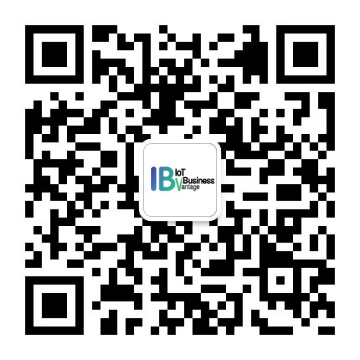SS23-U4 模组规格书
更新时间:2025-11-17 08:20:53下载pdf
SS23-U4 是由涂鸦智能开发的一款低功耗嵌入式 433 MHz 频点 Sub-G 通信模组。它由一个高集成度的无线射频芯片 EFR32FG23B020F512IM40-C 和少量外围器件构成,内置了网络协议栈和丰富的库函数。
产品概述
SS23-U4 内嵌低功耗的 32 位 78 MHz ARM Cortex®-M33 CPU、64 kB RAM、512 kB Flash 和丰富的外设资源。用户可以基于这些开发满足自己需求的嵌入式 Sub-G 通信产品。
特性
- 内置低功耗 32 位 CPU,可以兼作应用处理器
- 主频支持 78 MHz
- 工作电压:1.8 V - 3.8 V
- 外设:13×GPIOs、1×UART、1×ADC
- Sub-G 连通性
- 433 MHz 工作频点
- 传输速率 2.4 kbps-100 kbps
- +14 dBm 的输出功率
- 外接 IPEX 天线或者弹簧天线
- 工作温度:-40℃ 到 125℃
应用领域
- 智能楼宇
- 智慧家居/家电
- 智能插座、智慧灯
- 工业无线控制
- 婴儿监控器
- 网络摄像头
- 智能公交
模组接口
尺寸封装
SS23-U4 共有 3 排引脚,两侧边引脚间距为 1.4±0.1 mm,底部引脚间距 1.8±0.1 mm。
SS23-U4 尺寸大小:20.3±0.35 mm (L) × 15.8±0.35 mm (W) × 2.5±0.15 mm (H)。
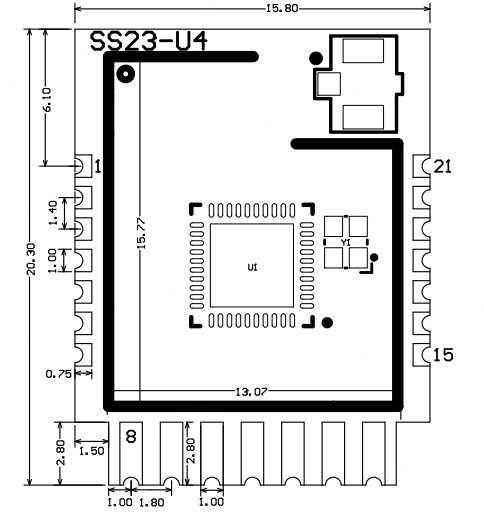
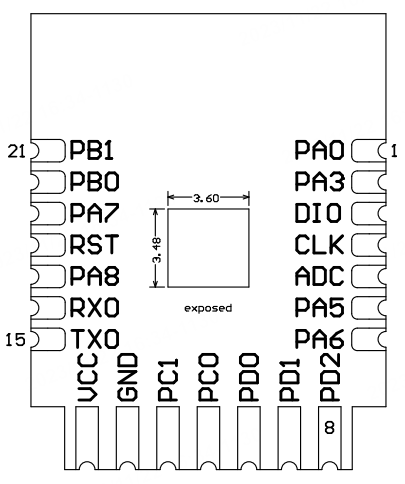
引脚定义
| 引脚序号 | 符号 | IO 类型 | 功能 |
|---|---|---|---|
| 1 | PA0 | I/O | 普通 IO 引脚,对应 IC 的 PA00 |
| 2 | PA3 | I/O | 普通 IO 引脚,对应 IC 的 PA03 |
| 3 | DIO | I/O | 烧录引脚,SWDIO,对应 IC 的 PA02 |
| 4 | CLK | I/O | 烧录引脚,SWCLK,对应 IC 的 PA01 |
| 5 | ADC | I | ADC 引脚,对应 IC 的 PA04 |
| 6 | PA5 | I/O | 普通 IO 引脚,对应 IC 的 PA05 |
| 7 | PA6 | I/O | 普通 IO 引脚,对应 IC 的 PA06 |
| 8 | PD2 | I/O | 支持硬件 PWM,对应 IC 的 PD02 |
| 9 | PD1 | I/O | 支持硬件 PWM,对应 IC 的 PD01 |
| 10 | PD0 | I/O | 支持硬件 PWM,对应 IC 的 PD00 |
| 11 | PC0 | I/O | 支持硬件 PWM,对应 IC 的 PC00 |
| 12 | PC1 | I/O | 支持硬件 PWM,对应 IC 的 PC01 |
| 13 | GND | P | 电源接地引脚 |
| 14 | VCC | P | 电源引脚(3.3V) |
| 15 | TX0 | I/O | UART_TXD0,烧录授权引脚,对应 IC 的 PC02 |
| 16 | RX0 | I/O | UART_RXD0,烧录授权引脚,对应 IC 的 PC03 |
| 17 | PA8 | I/O | 普通 IO 引脚,对应 IC 的 PA08 |
| 18 | RST | I/O | 复位引脚,低电平有效,对应 IC 的 RESETn |
| 19 | PA7 | I/O | 普通 IO 引脚,对应 IC 的 PA07 |
| 20 | PB0 | I/O | 普通 IO 引脚,对应 IC 的 PB00 |
| 21 | PB1 | I/O | 普通 IO 引脚,对应 IC 的 PB01 |
电气参数
绝对电气参数
| 参数 | 描述 | 最小值 | 最大值 | 单位 |
|---|---|---|---|---|
| Ts | 存储温度 | -40 | 125 | ℃ |
| VBAT | 供电电压 | 1.8 | 3.8 | V |
| 静电释放电压(人体模型) | TAMB-25℃ | - | 2 | KV |
| 静电释放电压(机器模型) | TAMB-25℃ | - | 0.5 | KV |
正常工作条件
| 参数 | 描述 | 最小值 | 典型值 | 最大值 | 单位 |
|---|---|---|---|---|---|
| Ta | 工作温度 | -40 | - | 125 | ℃ |
| VBAT | 供电电压 | 2.1 | 3.3 | 3.6 | V |
| VIL | IO 低电平输入 | -0.3 | - | VCC*0.3 | V |
| VIH | IO 高电平输入 | VCC*0.75 | - | VCC | V |
| VOL | IO 低电平输出 | - | - | VCC*0.1 | V |
| VoH | IO 高电平输出 | VCC*0.8 | - | VCC | V |
| Imax | IO 驱动电流 | - | - | 12 | mA |
连续发射和接收时功耗
| 工作状态 | 模式 | 速率 | 发射功率/接收 | 平均值 | 峰值(典型值) | 单位 |
|---|---|---|---|---|---|---|
| 发射 | FSK | 50kbps | +14dBm | 100 | 111 | mA |
| 接收 | FSK | 100kbps | -109dBm | 7 | 17 | mA |
| 低功耗监听 | 1s周期1ms跳变 | / | / | TBD | / | μA |
| 低功耗节点 | 中断唤醒后入网过程(3s) | / | / | TBD | / | mA |
工作电流
| 工作模式 | 工作状态,Ta=25℃ | 平均值 | 最大值(典型值) | 单位 |
|---|---|---|---|---|
| 快连配网状态 | 模组处于快连配网状态 | 4.7 | 13 | mA |
| 网络连接状态 | 模组处于联网工作状态 | 7 | 17 | mA |
| 断网状态 | 模组处于断网状态 | 4 | TBD | mA |
射频参数
基本射频特性
| 参数项 | 详细说明 |
|---|---|
| 工作频率 | 433.05-434.79 MHz |
| 物理层标准 | IEEE 802.15.4 g/c |
| 数据传输速率 | 2.4 kbps - 100 kbps |
| 天线类型 | 外接 IPEX 天线或者弹簧天线 |
发射性能
TX 连续发送性能
| 参数项 | 最小值 | 典型值 | 最大值 | 单位 |
|---|---|---|---|---|
| RF平均输出功率 | - | 14 | - | dBm |
| 频率误差 | -10 | - | 10 | ppm |
接收性能
RX 灵敏度
| 参数项 | 最小值 | 典型值 | 最大值 | 单位 |
|---|---|---|---|---|
| RX灵敏度 100 kbps 2GFSK signal | - | -109 | - | dBm |
天线信息
天线类型
有弹簧天线和外接天线两种天线接入方式。默认方式是 弹簧天线。
降低天线干扰
在模组上使用弹簧天线时,为确保天线性能的最优化,建议模组天线部分和其他金属件距离至少在 10mm 以上。
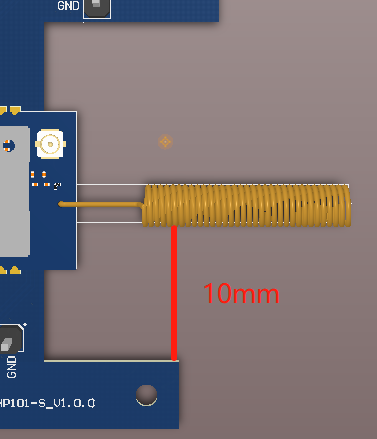
弹簧天线规格
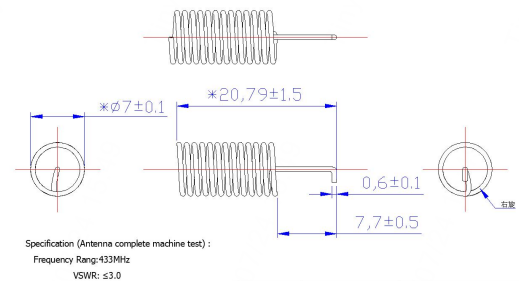
天线连接器规格
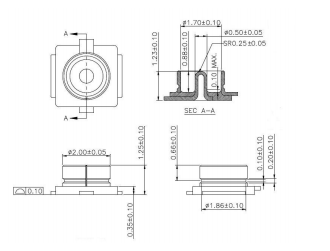
封装信息及生产指导
机械尺寸
PCB 尺寸大小:20.3±0.35 mm (W) × 15.8±0.35 mm (L) × 1.0±0.1 mm (H)。


侧视图

原理图封装
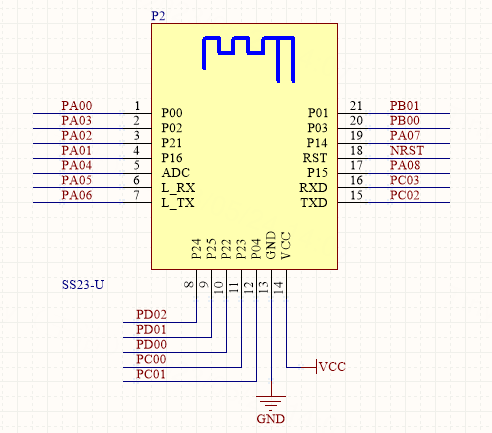
PCB推荐封装
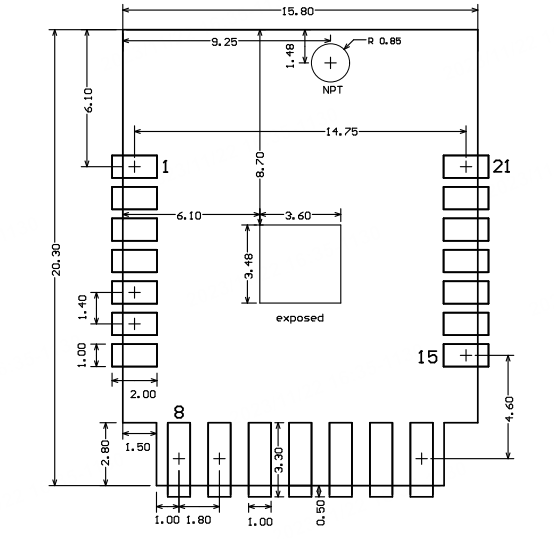
生产指南
-
涂鸦出厂的贴片封装模组建议使用 SMT 机器贴片,拆开包装后建议在 24 小时内完成焊接。如果拆封后未使用完,建议放置在湿度不超过 10%RH 的干燥柜内,或重新进行真空包装并记录暴露时间。总暴露时间不超过 168 小时。
- SMT 贴片所需仪器或设备:
- 贴片机
- SPI
- 回流焊
- 炉温测试仪
- AOI
- 烘烤所需仪器或设备:
- 柜式烘烤箱
- 防静电耐高温托盘
- 防静电耐高温手套
- SMT 贴片所需仪器或设备:
-
涂鸦出厂的模组存储条件如下:
-
防潮袋必须储存在温度 <40℃、湿度 <90%RH 的环境中
-
干燥包装的产品,保质期为从包装密封之日起 12 个月的时间
-
密封包装内装有湿度指示卡:
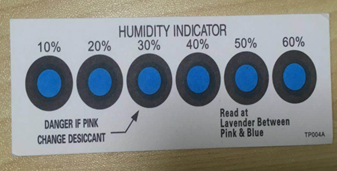
-
-
涂鸦出厂的模组当出现可能受潮的情况下需要进行烘烤:
- 拆封前发现真空包装袋破损。
- 拆封后发现包装袋内没有湿度指示卡。
- 拆封后如果湿度指示卡读取到 10% 及以上色环变为粉色。
- 拆封后总暴露时间超过 168 小时。
- 从首次密封包装之日起超过 12 个月。
-
烘烤参数如下:
- 烘烤温度:卷盘包装 40℃,小于等于 5%RH。托盘包装 125℃,小于等于 5%RH(耐高温托盘非吸塑盒拖盘)。
- 烘烤时间:卷盘包装 168 小时,托盘包装 12 小时。
- 报警温度设定:卷盘包装 50℃,托盘包装 135℃。
- 自然条件下冷却到 36℃ 以下后,即可进行生产。
- 若烘烤后暴露时间大于 168 小时没有使用完,请再次进行烘烤。
- 如果暴露时间超过 168 小时未经过烘烤,不建议使用波峰焊接工艺焊接此批次模组,因模组为 3 级湿敏器件超过允许的暴露时间很可能受潮,进行高温焊接时可能导致器件失效或焊接不良。
-
在整个生产过程中请对模组进行静电放电(ESD)保护。
-
为了确保产品合格率,建议使用 SPI 和 AOI 测试设备来监控锡膏印刷和贴装品质。
推荐炉温曲线
请根据回流焊曲线图进行 SMT 贴片,峰值温度 245℃,回流焊温度曲线如下图所示:
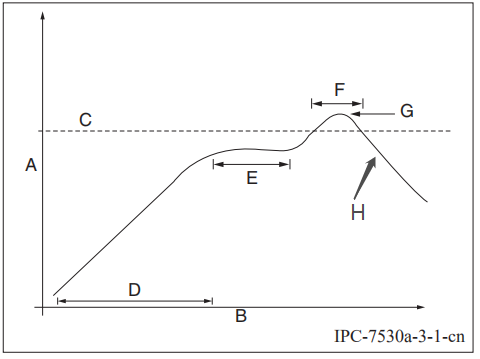
-
A:温度轴
-
B:时间轴
-
C:合金液相线温度:217-220℃
-
D:升温斜率:1-3℃/S
-
E:恒温时间:60-120S,恒温温度:150-200℃
-
F:液相线以上时间:50-70S
-
G:峰值温度:235-245℃
-
H:降温斜率:1-4℃/S
注意:以上推荐曲线以 SAC305 合金焊膏为例。其他合金焊膏请按焊膏规格书推荐炉温曲线设置。
储存条件
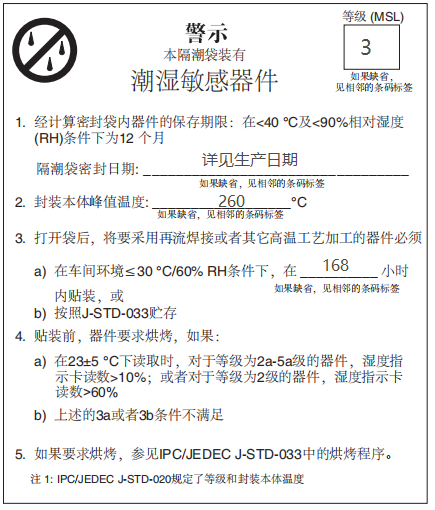
模组 MOQ 与包装信息
| 产品型号 | MOQ(pcs) | 出货包装方式 | 每个卷盘存放模组数(pcs) | 每箱包装卷盘数(盘) |
|---|---|---|---|---|
| SS23-U4 | 4000 | 载带卷盘 | 1000 | 4 |
附录:声明
FCC Caution: Any changes or modifications not expressly approved by the party responsible for compliance could void the user’s authority to operate this device.
This device complies with Part 15 of the FCC Rules. Operation is subject to the following two conditions: (1) This device may not cause harmful interference, and (2) this device must accept any interference received, including interference that may cause undesired operation.
Note: This device has been tested and found to comply with the limits for a Class B digital device, according to part 15 of the FCC Rules. These limits are designed to provide reasonable protection against harmful interference in a residential installation. This device generates, uses, and can radiate radio frequency energy and, if not installed and used following the instructions, may cause harmful interference to radio communications. However, there is no guarantee that interference will not occur in a particular installation.
If this device does cause harmful interference to radio or television reception, which can be determined by turning the device off and on, the user is encouraged to try to correct the interference by one or more of the following measures:
- Reorient or relocate the receiving antenna.
- Increase the separation between the device and receiver.
- Connect the device into an outlet on a circuit different from that to which the receiver is connected.
- Consult the dealer or an experienced radio/TV technician for help.
Radiation Exposure Statement
This device complies with FCC radiation exposure limits set forth for an uncontrolled rolled environment. This device should be installed and operated with a minimum distance of 20cm between the radiator and your body.
Important Note
This radio module must not be installed to co-locate and operating simultaneously with other radios in the host system except following FCC multi-transmitter product procedures. Additional testing and device authorization may be required to operate simultaneously with other radios.
The availability of some specific channels and/or operational frequency bands are country dependent and are firmware programmed at the factory to match the intended destination. The firmware setting is not accessible by the end-user.
The host product manufacturer is responsible for compliance with any other FCC rules that apply to the host not covered by the modular transmitter grant of certification. The final host product still requires Part 15 Subpart B compliance testing with the modular transmitter installed.
The end-user manual shall include all required regulatory information/warnings as shown in this manual, including “This product must be installed and operated with a minimum distance of 20 cm between the radiator and user body”.
该内容对您有帮助吗?
是意见反馈该内容对您有帮助吗?
是意见反馈


